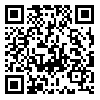Volume 12, Issue 49 (3-2019)
Research on Addiction 2019, 12(49): 155-172 |
Back to browse issues page
Download citation:
BibTeX | RIS | EndNote | Medlars | ProCite | Reference Manager | RefWorks
Send citation to:



BibTeX | RIS | EndNote | Medlars | ProCite | Reference Manager | RefWorks
Send citation to:
Mirahmadi B, Hasani J. Effect of Emotion Regulation Skills Training Based on Dialectical Behavioral Therapy on Impulsiveness among Substance Abusers: Single-Subject Study. Research on Addiction 2019; 12 (49) :155-172
URL: http://etiadpajohi.ir/article-1-1980-en.html
URL: http://etiadpajohi.ir/article-1-1980-en.html
kharazmi University
Abstract: (5673 Views)
Objective: Impulsivity is one of the personality risk factors of substance use tendency. The aim of this study was to determine the effectiveness of emotion regulation skills training based on dialectical behavioral therapy in impulsivity among substance abusers. Method: The current research was conducted within the framework of experimental single-subject design. Based on structured diagnostic interviews and entry criteria, four men with substance abuse disorders were randomly selected and were individually trained in 10 sessions of emotion regulation training based on dialectical behavioral therapy. Barratt Impulsiveness Scale (2004) was employed to measure impulsivity. Results: The results of this study showed that the training of emotion regulation training based on dialectical behavior therapy to participants reduced the scores of all four subjects in attention impulsiveness, motor impulsiveness, and nonplanning impulsiveness. In fact, all four participants experienced a significant reduction in this scale during the training sessions. Conclusion: Interventions based on impulsiveness reduction, such as training of emotion regulation strategies can play a central role in the treatment and prevention of drug abuse.
Type of Study: Research |
Subject:
Special
Received: 2019/01/27 | Accepted: 2019/04/2 | Published: 2019/04/11
Received: 2019/01/27 | Accepted: 2019/04/2 | Published: 2019/04/11
| Rights and permissions | |
 |
This work is licensed under a Creative Commons Attribution-NonCommercial 4.0 International License. |





